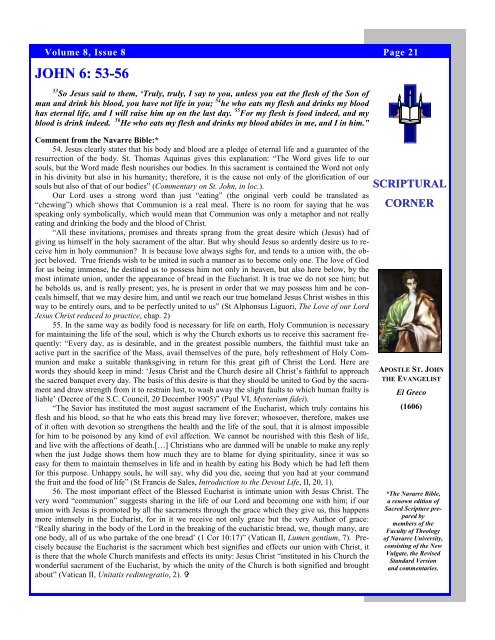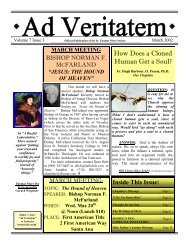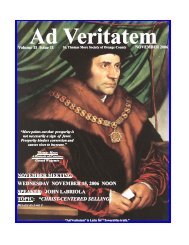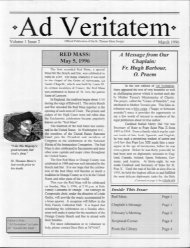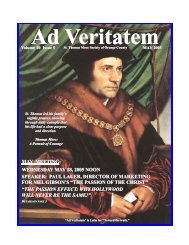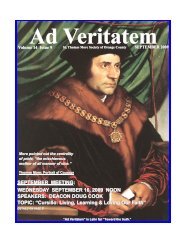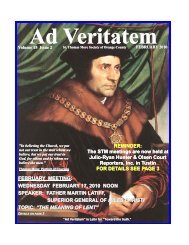You also want an ePaper? Increase the reach of your titles
YUMPU automatically turns print PDFs into web optimized ePapers that Google loves.
Volume 8, Issue 8JOHN 6: 53-565653 So Jesus said to them, ‘Truly, truly, I say to you, unless you eat the flesh of the Son ofman and drink his blood, you have not life in you; 54 he who eats my flesh and drinks my bloodhas eternal life, and I will raise him up on the last day. 55 For my flesh is food indeed, and myblood is drink indeed. 56 He who eats my flesh and drinks my blood abides in me, and I in him.”Page 21Comment from the Navarre Bible:*54. Jesus clearly states that his body and blood are a pledge of eternal life and a guarantee of theresurrection of the body. St. Thomas Aquinas gives this explanation: “The Word gives life to oursouls, but the Word made flesh nourishes our bodies. In this sacrament is contained the Word not onlyin his divinity but also in his humanity; therefore, it is the cause not only of the glorification of oursouls but also of that of our bodies” (Commentary on St. John, in loc.).Our Lord uses a strong word than just “eating” (the original verb could be translated as“chewing”) which shows that Communion is a real meal. There is no room for saying that he wasspeaking only symbolically, which would mean that Communion was only a metaphor and not reallyeating and drinking the body and the blood of Christ.“All these invitations, promises and threats sprang from the great desire which (Jesus) had ofgiving us himself in the holy sacrament of the altar. But why should Jesus so ardently desire us to receivehim in holy communion? It is because love always sighs for, and tends to a union with, the objectbeloved. True friends wish to be united in such a manner as to become only one. The love of Godfor us being immense, he destined us to possess him not only in heaven, but also here below, by themost intimate union, under the appearance of bread in the Eucharist. It is true we do not see him; buthe beholds us, and is really present; yes, he is present in order that we may possess him and he concealshimself, that we may desire him, and until we reach our true homeland Jesus Christ wishes in thisway to be entirely ours, and to be perfectly united to us” (St Alphonsus Liguori, The Love of our LordJesus Christ reduced to practice, chap. 2)55. In the same way as bodily food is necessary for life on earth, Holy Communion is necessaryfor maintaining the life of the soul, which is why the Church exhorts us to receive this sacrament frequently:“Every day, as is desirable, and in the greatest possible numbers, the faithful must take anactive part in the sacrifice of the Mass, avail themselves of the pure, holy refreshment of Holy Communionand make a suitable thanksgiving in return for this great gift of Christ the Lord. Here arewords they should keep in mind: ‘Jesus Christ and the Church desire all Christ’s faithful to approachthe sacred banquet every day. The basis of this desire is that they should be united to God by the sacramentand draw strength from it to restrain lust, to wash away the slight faults to which human frailty isliable’ (Decree of the S.C. Council, 20 December 1905)” (Paul VI, Mysterium fidei).“The Savior has instituted the most august sacrament of the Eucharist, which truly contains hisflesh and his blood, so that he who eats this bread may live forever; whosoever, therefore, makes useof it often with devotion so strengthens the health and the life of the soul, that it is almost impossiblefor him to be poisoned by any kind of evil affection. We cannot be nourished with this flesh of life,and live with the affections of death.[…] Christians who are damned will be unable to make any replywhen the just Judge shows them how much they are to blame for dying spirituality, since it was soeasy for them to maintain themselves in life and in health by eating his Body which he had left themfor this purpose. Unhappy souls, he will say, why did you die, seeing that you had at your commandthe fruit and the food of life” (St Francis de Sales, Introduction to the Devout Life, II, 20, 1).56. The most important effect of the Blessed Eucharist is intimate union with Jesus Christ. Thevery word “communion” suggests sharing in the life of our Lord and becoming one with him; if ourunion with Jesus is promoted by all the sacraments through the grace which they give us, this happensmore intensely in the Eucharist, for in it we receive not only grace but the very Author of grace:“Really sharing in the body of the Lord in the breaking of the eucharistic bread, we, though many, areone body, all of us who partake of the one bread’ (1 Cor 10:17)” (Vatican II, Lumen gentium, 7). Preciselybecause the Eucharist is the sacrament which best signifies and effects our union with Christ, itis there that the whole Church manifests and effects its unity: Jesus Christ “instituted in his Church thewonderful sacrament of the Eucharist, by which the unity of the Church is both signified and broughtabout” (Vatican II, Unitatis redintegratio, 2). SCRIPTURALCORNERAPOSTLE ST. JOHNTHE EVANGELISTEl Greco(1606)*The Navarre Bible,a renown edition ofSacred Scripture preparedbymembers of theFaculty of Theologyof Navarre University,consisting of the NewVulgate, the RevisedStandard Versionand commentaries.


